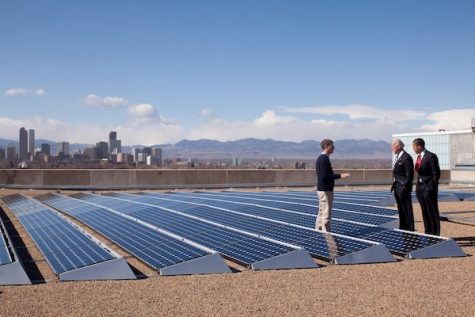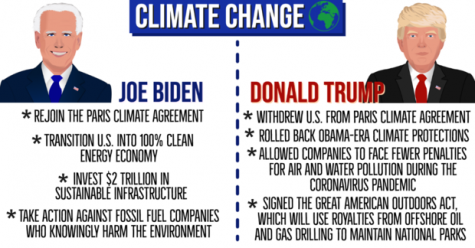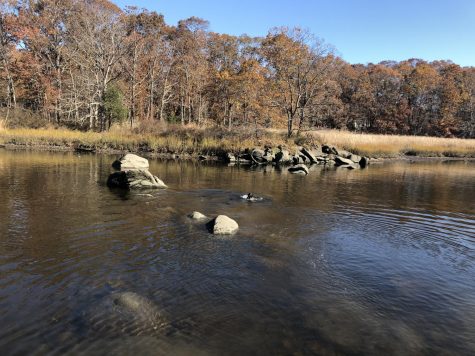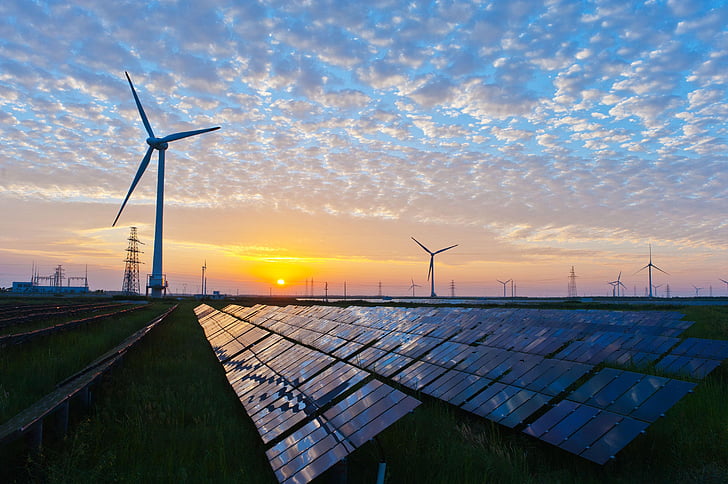What Joe Biden’s Presidential Win Means for the Environment
Featured image via PickPik
On Saturday, November 7, Joe Biden was projected as the winner of the 2020 presidential election. He addressed the nation later that day with Vice President-elect Kamala Harris in Delaware where they accepted the results. In their speeches, President-elect Biden and Vice President-elect Kamala Harris explained what this victory means to them and the nation. As president-elect Biden has been stating from very early in his campaign, he assured the nation in his speech that he would work to be an American president, and stressed the importance of unity and cooperation in such a divided time. In both Harris’ and Biden’s speeches, they emphasized major core issues that they promised would transition into key policies once inaugurated.
Biden promised by November 9th to select key scientists for his task force to control and prevent the further spread of COVID-19. This committee would create a plan to be implemented when they are inaugurated. Not only that, Biden and Harris spoke on the racial injustice this country has witnessed and the will of the American people to end systemic racism, the struggle to rebuild the economy, the push to establish healthcare that works for all Americans, and the need to control the current climate crisis.
The goals proposed under Biden during his campaign to combat climate change are the most ambitious of any American president faced with the same issue, according to NPR. On Joe Biden’s Official Campaign Website, in addition to listing comprehensive plans on topics ranging from immigration to small business, he outlines his goals to ‘tackle the climate emergency.’

On Biden’s first day after the inauguration, he guarantees to reenter the Paris Climate Accord that President Trump left, with the promise to help establish the United States as a global superpower once again and work alongside countries to set goals that can be enforced across the globe. Biden has already formulated his own environmental goals for the nation as well, stating that he will “ensure the U.S. achieves a 100% clean energy economy and reaches net-zero emissions no later than 2050.” With this, Biden vows to hold countries accountable who have caused major damage, like China as the largest emitter of carbon emissions. Biden not only addresses environmental issues on an international level, he also promises to create 10 million US jobs as he hopes to establish America as a leading country in the clean energy economy through energy sources like solar and wind.
With the use of executive order, he could possibly remove some of President Trump’s 159 climate-related actions that pushed back regulations and environmental protection, according to National Geographic’s article, “The environment is in trouble. Here’s what Biden can do to address it.” One of these actions was Trump’s reversal of a policy under the Obama Administration that ordered federal agencies to reduce their greenhouse gas emissions by 40% in the current decade. With this power, Biden could take the strategies he crafted with President Obama on issues like setting vehicle emissions (Under the existing Clean Air Act), establishing green energy innovations and rebates for Americans, and investing money in climate research. He could then alter them to function under the current time and status of America. With a harsh divide in Congress between political parties, Biden will have to make policies and laws that will get passed across the aisle as well, otherwise, the limitations of possible Republican control of the Senate might hold him back.

Throughout the campaigning stage, President Trump has ridiculed Joe Biden’s environmental plans, stating he supports the Green New Deal, a policy created by the Democratic Party members of Congress, primarily Representative Alexandria Ocasio-Cortez of New York and Senator Ed Markey of Massachusetts. The Green New Deal is a resolution that would resolve economic inequality and racial injustice that stems from the climate crisis but has been branded as too progressive by many Republicans and moderate Democrats in Congress and President Trump. In the Presidential Debate held on Tuesday, September 29, Biden dismissed Trump’s accusation, claiming that he does not support the Green New Deal but the ‘Biden Plan.’ That plan takes the Green New Deal and uses it as a ‘framework,’ according to Biden’s website. He also states there that the Green New Deal “…powerfully captures two basic truths, which are at the core of his plan: (1) The United States urgently needs to embrace greater ambition on an epic scale to meet the scope of this challenge, and (2) our environment and our economy are completely and totally connected.” In Biden’s plan, he recognizes the same issues of how climate change disproportionately affects low-income communities and minorities, and offers solutions. He vows to work with the Justice Department and Environmental Protection Agency to hold major polluters from large corporations accountable through anti-pollution legal cases and work with the Department of Housing and Urban Development to protect these communities with more efficient housing.
Back in 1973, Joe Biden voted to pass the original Endangered Species Act. Since then, he has condemned President Trump when he shifted the rules of the ESA by making it harder for threatened species to be designated as protected and to preserve habitats that are crucial to some species’ survival. National Geographic’s article, “Could endangered species and other animals fare better under Biden?” states that the Trump administration has made it easier for companies to not violate environmental laws when they harm species. For example, in the Migratory Bird Treaty Act, Trump has changed the law to eliminate fines on companies that unintentionally kill protected species of birds. Putting the industry and economy above the environment is not something Biden plans to do as President, and he has shown where his values lie during his time as Vice President. When the Obama administration rewrote a recovery plan for the northern spotted owl, they helped favor the species’ survival rather than the interest of the logging companies that were prioritized under President Bush’s administration.
In the past, Biden has enacted many climate bills and policies while holding a public office, whether as a senator from Delaware or as Vice President. He introduced one of the first climate bills to Congress in 1986 and was crucial in passing the Tropical Forest Conservation Act that promised ‘debt-for-nature swaps,’ where countries could reduce their debt to American by conserving and protecting ecosystems like tropical forests. He also worked on the Recovery Act under the Obama Administration that invested money into clean energy for the United States.

The Biden-Harris plan is extremely promising for many environmentalists around the world. The United States should act as a role model for other countries in their values and priorities, and climate change is no exception. Greenpeace USA, a global nonprofit dedicated to exposing environmental problems through the world, created a scorecard aimed to bring awareness to American voters on how both Joe Biden and Donald Trump ranked on tackling environmental policies. While President-elect Biden received a B+ for his vows to eradicate fossil fuels and implementing inclusive laws to reduce emission, Donald Trump received a zero out of one hundred, or F on their ranking.
Americans who hope for a greener and more sustainable future need to hold Biden accountable for the extensive promises he has made. His climate plan aims to alter the economy through greener automobiles, housing, buildings, energy sources, and more. While some argue his proposed ideas are not doing enough, like Biden’s stance to not end fracking, others are not adamant about his costly ideas. No matter how skeptical people may be about the incentives and goals the president-elect has, the bottom line is that we only have around ten years before the worst of the damage done to climate change is irreversible, according to the United Nations. The time to establish progress and ensure our prosperity for the future is now, and it can’t be put off any longer.
Throughout the four years he served as president, Donald Trump has denied the reality of the climate crisis, and repeatedly put our most vulnerable ecosystems and communities in harm’s way. This new transition of power could be seen to many Americans as a sign of hope, and an opportunity to boost equal environmental protection to the front line of our nation’s priorities.
For more information about Joe Biden’s environmental plans, check out these videos:
Biden Plan for a Clean Energy Revolution & Environmental Justice | Joe Biden for President
Joe Biden Unveils $2 Trillion Climate And Infrastructure Plan


